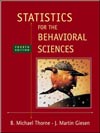| statistical hypotheses | predictions about a population based on sample results
|
 |
 |
 |
| gambler's fallacy | the mistaken belief that the probability of a particular event changes with a long string of the same event
|
 |
 |
 |
| probability | the proportion of times an event would occur if the chances for occurrence were infinite
|
 |
 |
 |
| theoretical probability | the way things are supposed to work according to probability theory
|
 |
 |
 |
| real-world probability | probability based on experiential data
|
 |
 |
 |
| personal (subjective) probability | probability based on an individual's experience
|
 |
 |
 |
| Bayesian statistics | statistics that uses subjective probability as a starting point for assessing a subsequent probability
|
 |
 |
 |
| addition rule of probability | for independent events, the probability of either one event or another is equal to the sum of the probabilities of the individual events
|
 |
 |
 |
| multiplication rule of probability | the probability of two or more independent events occurring on separate occasions is the product of their individual probabilities
|
 |
 |
 |
| independent events | events for which the occurrence of one event does not alter the probability of any other event
|
 |
 |
 |
| nonindependent events | events for which the occurrence of one event alters the probability of any other event
|
 |
 |
 |
| conditional probability | the probability of an event given that another event has already occurred
|
 |
 |
 |
| binomial distribution | probability distribution based on events for which there are only two possible outcomes on each occurrence
|



 2003 McGraw-Hill Higher Education
2003 McGraw-Hill Higher Education